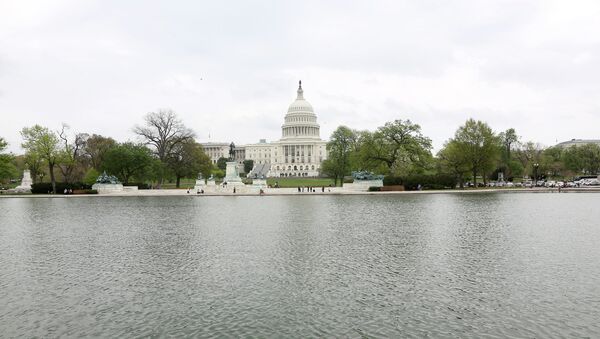WASHINGTON, November 4 (RIA Novosti) — The most expensive midterm election in US history is also marked by less transparency in campaign finance and portends a possible rise in special interest spending in the 2016 elections, experts told RIA Novosti.
"It's a bedrock principle of our campaign finance system that voters should know who is financing their candidates, and the fact that hundreds of millions of dollars are being spent by groups that don't disclose their donors cuts against that," Vivera Novak, the editorial and communications director of the Center for Responsive Politics (CRP), a Washington-based watchdog, told RIA Novosti.
The 2014 midterm election is set to be the most expensive on record, by some estimates as high as $4 billion, according to the CRP.
Behind the election is a growing web of nontransparent funding that empowers the influential and wealthy, and threatens to tie elected representatives to special interests as opposed to that of citizens, analysts said.
Election spending is separated into that provided through the parties and candidates, which is transparent and faces donation limits, and so-called "outside" groups – Super Political Action Committees (PACs) and political advocacy nonprofits. The CRP estimates outside spending, which is "overwhelmingly fueled by large donors," will hit $689.3 million, or roughly 14 percent of total spending this election.
"Super PACs must disclose their donors. Other groups [nonprofits] aren't required to," Novak explained. "Both Super PACs and dark money groups get their funds mostly from wealthy individuals. They can accept that money in any amount, and likewise they can spend any amount."
According to the CRP, the top 20 individual donors donated $168.6 million to outside groups, while the top 20 organizations donated another $166 million.
Large campaign donations combined with little transparency is undemocratic, Kay Schlozman, a professor of political science at Boston College and expert on US elections, told RIA Novosti.
"People with very deep pockets… regardless of on which side of the aisle, by giving huge campaign donations they have the possibility of having more influence than the ordinary voter on the outcome of the election, which is why they are giving," Scholzman said. "That of course is in a certain way antidemocratic. Democracy is supposed to be a level field on which we are all equal."
The explosion in outside funding is one result of Citizens United, a Supreme Court case in which the court ruled that corporations and non-profits could raise and use unlimited funds for independent advocacy to inform the public so long as they are not formally tied to a candidate or party.
Schlozman said that in addition to court rulings that have changed the campaign finance regime, polarization between Democrats and Republicans on every issue Americans care about, as well as a balance in the parties' strengths is a factor in rising campaign expenditures.
"There is every incentive from these three factors to raise as much money as possible," she said.
Both experts said outside funding could have implications beyond the midterms and into the 2016 presidential election, as both Republicans and Democrats benefit from Super PACs and nonprofits.
"It seems likely that if there are no changes in the legal landscape the amount of outside spending will increase in 2016," Novak said.
Schlozman said the court decisions over campaign finance have changed the game and now that "money has been clearly defined as a form of speech" it will be much harder to regulate, though laws on disclosure might help increase transparency.
"Certainly no one I know is predicting that the arms race of competitive campaign finance is going to abate," Schlozman said, adding that there isn't much political will in Congress for campaign finance reform that would cost money.
On Tuesday, Americans will go to the polls to elect 435 members of the House of Representatives, 36 senators, 36 governors and 46 state legislatures in what is called midterm elections as they occur midway between the sitting president's four-year term. President Barack Obama has another two years in office.



